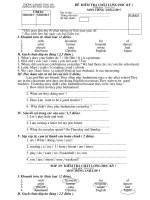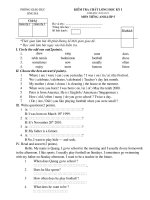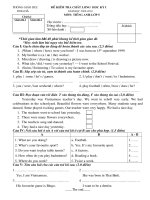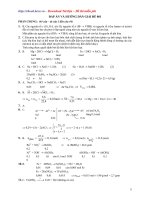Tài liệu Đề thi thử ĐH-CĐ môn Tiếng Anh (Khối D)_THPT Quỳnh Lưu IV doc
Bạn đang xem bản rút gọn của tài liệu. Xem và tải ngay bản đầy đủ của tài liệu tại đây (82.46 KB, 7 trang )
Last saved by Professor. DAT - Copyright ©
1
SỞ GIÁO DỤC ĐÀO TẠO NGHỆ AN ĐỀ THI THỬ ĐẠI HỌC, CAO ĐẲNG 2009 lần I
TRƯỜNG THPT QUỲNH LƯU IV Môn: Tiếng Anh(Khối D)
Thời gian làm bài: 90 phút
Họ và tên thí sinh:
Số báo danh:
Đề thi gồm 80 câu trắc nghiệm(từ câu 1 ñến câu 80)làm vào phiếu trắc nghiệm.
Chọn phương án(A, B, C hoặc D)ứng với từ có trọng âm chính nhấn vào âm tiết có vị trí
khác với 3 từ còn lại trong mỗi câu.
1. A. teacher B. design C. after D. kingdom.
2. A. vanilla B. infamous C. banana D. Canada.
3. A. opponent B. beautiful C. calendar D. dinosaur.
4. A. instrument B. astonish C. cultural D. obviously.
5. A. excel B. pricise C. imply D. passage.
Chọn phương án ñúng(A, B, C hoặc D) ñể hoàn thành mỗi câu sau.
6. There are so many thing to do that we never get
A. interesting/boring B. interested/bored C. interested/boring D. interesting/bored.
7. It was we could not go now.
A. such cold that B. so cold C. very so cold that D. too cold that.
8. No longer clean the floor. I have just bought a vacuum cleaner.
A. do I have to B. I do have to C. I have to D. have I to.
9. I could speak words of French, but I wasn’t very fluent.
A. little B. a little C. few D. a few.
10. We must be quick. There’s time.
A. little B. a little C. few D. a few.
11. She has just bought
A. an old interesting painting French B. old an interesting painting French
C. a French old interesting painting D. an interesting old French painting.
12. He looks younger than his wife, in fact he is a lot older.
A. actual B. actually C. action D. acting.
13. those present were the Prime Minister and his wife.
A. Whatever B. Actually C. Among D. Whoever.
14. He didn’t wear warm clothes cold it was.
A. whenever B. however C. whoever D. whatever.
15. What is the synonym of trader?
A. vendor B. merchant C. seller D. business.
16. I have known Jack ten years.
A. since B. in C. almost D. for.
17. What do you call the person who collects stamps?
A. stamper B. collector C. collecting D. stamp collector
18. The New Oxford Garage is for more salesmen.
A. advertising B. informing C. requesting D. advising.
19. I have three books. One is nime, are yours.
A. the others B. another C. the other D. others.
20. Does that newspaper the government or oppose it?
A. advantage B. assist C. encourage D. support.
21. It’s distressing to see small children in the streets.
A. pleading B. imploring C. begging D. entreating.
Last saved by Professor. DAT - Copyright ©
2
22. Most of my friends are reporters.
A. newspapers B. newspaper C. newspaper’s D. newspapers’.
23. I have a car, I prefer to travel by train.
A. In spite of B. Despite C. Because D. Although.
24. There were many big tree, between me and the river and now they all fell down into the
water.
A. each other B. one after another C. one another D. a lot.
25. Even though I hadn’t spoken English for many years, I picked it again after a few weeks.
A. on B. over C. up D. through.
Đọc kỹ ñoạn văn sau và chọn phương án ñúng(A, B, C hoặc D)cho mỗi chỗ trống.
Water is our life source. It makes up 70 percent of (26) bodies and the average person
actually spends 18 months of his life (27) bath or shower.
But we are only now learning how to look (28) water. Acid rain (29) polluted as
many as 18,000 lakes and our seas and rivers are polluted with waste products. It is now (30)
expensive to try to repair the damage which has been done. We have some hope for future, though,
(31) new sources of water have been discovered. People (32) in the Sahara Desert have
(33) fish swimming in deep underground streams. Scientists also believe (34) is a huge
lake underneath London. If we have (35) anything from our mistakes we try to keep these new
areas of water clean.
26. A. the B. their C. our D. these.
27. A. in B. to C. on D. at.
28. A. over B. on C. after D. to.
29. A. will B. has C. would D. is.
30. A. very B. such C. more D. much.
31. A. which B. because C. so D. even.
32. A. live B. living C. to live D. lived.
33. A. realized B. put C. looked D. found.
34. A. it B. here C. that D. there.
35. A. taught B. practised C. known D. learnt.
Đọc kỹ ñoạn văn sau và chọn phương án ñúng(A, B, C hoặc D)cho mỗi chỗ trống.
There’s now increasing concern about the world’s energy resources, particularly about those
involving fossil (36) . In less than a hundred years we shall probably (37) all the
present (38) of oil and gas. The world’s coal (39) should last longer but, once used,
these can not be (40) .
It is important, therefore, that we should develope such (41) sources of energy as solar
energy and nuclear energy as well as and wind (42) (classed as (43) energy). Until these
energy (44) are widely used, it is important fer the developed countries to reduce energy
(45) as much as possible.
36. A. fuels B. powers C. forms D. energies.
37. A. end B. complete C. total D. exhaust.
38. A. findings B. productions C. amounts D. sources.
39. A. reserves B. stores C. mines D. contents.
40. A. updated B. repeated C. renewed D. produced.
41. A. traditional B. alternative C. surprising D. revolutionary.
42. A. force B. strength C. power D. motion.
43. A. repeatable B. continual C. renewable D. continuous.
Last saved by Professor. DAT - Copyright ©
3
44. A. goods B. supplies C. provisions D. materials.
45. A. exhaustion B. destruction C. waste D. consumption.
Chọn phương án ñúng(A, B, C hoặc D)cho mỗi câu sau:
46. “How are you?”, he asked.
A. He asked me how are you B. He asked me how I am
C. He asked me how was I D. He asked me how I was.
47. “Where have you been?”, he asked.
A. He asked me where had I been B. He asked me where have you been
B. He asked me where I had been D. He asked me where you had been.
48. “What are you doing now?”, he asked.
A. He asked me what I am doing now B. He asked me what you were doing now
C. He asked me what was I doing now C. He asked me what I was doing now.
49. “Why did you come back?”, he asked.
A. He asked me why I had come back B. He asked me why had I come back
C. He asked me why did you come back C. He asked me why you had come back.
50. “Are you glad to be back?”, he asked.
A. He asked me if I was glad to be back B. He asked me was I glad to be back
B. He asked me if I am glad to be back D. He asked me are you glad to be back.
Chọn phương án ñúng(A, B, C hoặc D)ứng với từ/cụm từ có gạch chân cần phải sửa ñể
các câu sau trở thành câu ñúng.
51. Fertilizers (A) are used
(B) primarily to enrich (C) the soil and (D) increasing yield of crops.
52. Because (A) of the
approaching (B) storm, the wind began (C) to blow and the sky became (D)
dark as
evening.
53. (A) Ours
is among the (B) few schools in the country which (C) has been awarded the (D) status
as a standard school.
54. When (A) it is
frightened, for example, (B) by a storm, (C) dairy cows refuse (D) to give milk.
55. It (A) is said
that Nobel felt very (B) badly about the application (C) of his invention (D) to the
creation of weapons of war.
Đọc kỹ ñoạn văn sau và chọn phương án ñúng(A, B, C hoặc D).
Tsunami is a Japanese word which means harbour wave and is used as the scientific term for
seismic sea wave generated by an undersea earthquake or possibly an undersea landslide or volcanic
eruption. When the ocean floor is titled or offset during an earthquake, a set of waves is created
similar to the concentric waves generated by an object dropped into the water. Most tsunami is
originate along the Ring of Fire, a zone of volcanoes and seismic activity, 32,500 km long that
encircles the Pacific Ocean. Since 1819, about 40 tsunamis have struck the Hawaiian Islands.
A tisunami can have wavelengths, or widths, of 100 to 200 km, and may travel hundreds of
kilometres across the deep ocean, reaching speeds of about 725 to 800 kilometres an hour. Upon
entering shallow coastal waters, the wave, which may have been only about half a metre high out at
sea, suddenly grows rapidly. When the wave reaches the shore, it may be 15m high or more.
Tsunamis have tremendous energy because of the great volume of water affected. They are capable
of obliterating coastal settlements.
Tsunamis should not be confused with storm surges, which are domes of water that rise
underneath hurricanes or cyclones and cause extensive coastal flooding when the storms reach land.
Storm surges are particularly devastating if they occur at high tide. A cyclone and accompanying
storm surge killed an estimated 500,000 people in Bangladesh in 1970. The tsunami which struck
south and southeast Asia in late 2004 killed over 200 thousand people.
Last saved by Professor. DAT - Copyright ©
4
56. Scientfically, tsunami is the term for
A. seismic sea wave B. undersea earthquake
C. undersea landslide D. volcanvic eruption.
57. What does the word concentric mean?
A. Wavy B. Having many centres
C. Hacing a common centres D. A ring.
58. Which of the following may be a reason for a tsunami?
A. An inactive volcano B. A landslide on the seashore
C. An undersea earthquake D. A storm.
59. What will happen when an object is dropped into the water?
A. Volcanic eruption may be a consequence B. Some concentric waves will be generated
C. There will be seismic activity D. Earthquake may happen.
60. What is the zone of volcanoes and seismic activity in the world called?
A. The concentric B. The tsunami
C. The Pacific Ocean D. The Ring of Fire.
61. What is the greatest speed of tsunamis travelling across the deep ocean?
A. 200 kilometres an hour B. 700 kilometres an hour
C. 800 kilometres an hour D. 150,000 kilometres an hour.
62. How high is the wave of the tsunami when it reaches the shore?
A. 100 metres B. 200 metres C. Half a metre D. Fifteen metres.
63. How are tsunamis capable of obliterating coastal settlements?
A. They have tremendous energy due to the great volume of water affected.
B. They are a metre high or more.
C. They travel hundreds of kilometres.
D. They can strike the shore fifteen metres high.
64. What killed an estimated 500,000 people in Bangladesh?
A. A tsunami B. A cyclone and accompanying storm
C. A high tide C. Flooding.
65. Which of the following is NOT true?
A. Tsunamis only occur in Asia.
B. A cyclone along with storm surge happened in Asia in 1970.
C. Storm surges are domes of water rising underneath hurricanes or cyclones.
D. Storm surges cause extensive coastal flooding.
Đọc kỹ ñoạn văn sau và chọn phương án ñúng(A, B, C hoặc D).
Martin Luther King, Jr , is well known for his work in civil rights and for his many famous
speeches, among them his moving “I have a dream” speech. But fewer people know much about
King’s childhood. MI , as he was called, was born in 1929 in Atlanta, Georgia, at the home of his
maternal grandfather. M.L.’s grandfather, the Reverend A.D. Williams, purchased their home on
Auburn Avenue in 1909, twenty years before M.L. was born. The Reverend Williams, an eloquent
speaker, played an important role in the community since so many people’s lives centered around the
church. He allowed his church and his home to be used as a meeting place for a number of
organizations dedicated to the education and social advancement of blacks. M.L. grew up in this
atmosphere, with his home being used as a community gathering place, and was no doubt influenced
by it.
M.L’s childhood was not especially eventful. His father was a minister and his mother was a
musician. He was the second of three children, and he attended all-black schools in a black
Last saved by Professor. DAT - Copyright ©
5
neighbourhood. The neighbourhood was not poor, however. Auburn Avenue was the main artery
through a prosperous neighbourhood that had come to symbolise achievement for Atlanta’s black
people. It was an area of banks, insurance companies, builders, jewelers, tailors, doctors, lawyers,
and other black-owned or black-operated businesses and services. Even in the face of Atlanta’s
segregation, the district thrived. Dr. King never forgot the community spirit he had known as a child,
nor did he forget the racial prejudice that was a seemingly
insurmountable barrier that kept black
Atlantans from mingling with whites.
66. According to the author, M.L.
A. had a difficult childhood Atlanta B. grew up in a relatively rich area of
C. love to listen to his grandfather speak D. was a good musician as a child.
67. According to the author, King was influenced by
A. his mother B. his speeches C. community spirit D. black lawyers.
68. The word tailors in line 15 describes people who are associated with which of the following
trades?
A. shoe making B. garment making C. flower arranging D. book binding.
69. In line 15, the word It refers to which of the following?
A. segregation B. achievement C. neighbourhood D. services.
70. What is this passage mainly about?
A. Martin Luther King’s childhood B. M.Us grandfather
C. the prejudice that existed in Atlanta D. The neighbourhood King grew up.
71. As used in line 18, which of the following is closest in meaning to the word semmingly?
A. apparently B. inexplicably C. hastily D. inevitably.
72. As used in line 11, the word eventful is closest in meaning to which of the following?
A. admirable B. valued C. emotional D. memorable.
73. Which lines best describes King’s childhood?
A. lines 9-11 B. lines 7-8 C. lines 11-14 D. lines 5-6.
74. The word eloquent in line 5 means most nearly .
A. fascinating B. romantic C. powerful D. active.
75. According to the author, blacks in King’s neighbourhood were involved in all following
businesses and services EXCEPT:
A. law B. medicine C. banking D. dentistry.
Chọn phương án ñúng(A, B, C hoặc D) ứng với câu có nghĩa gần nhất với mỗi câu cho
sẵn.
76. The police questioned two men but neither of them could speak English.
A. The police questioned two Englishmen in English.
B. The police questioned two men who could not speak English.
C. Neither of the Englishmen was questioned by the police.
D. Either of the men could answer the police questions in English.
77. I used to work as a telephone operator.
A. I am used to working as a telephonist. B. I worked as a telephone operator and I am.
C. I no longer work as a telephone operator. D. Working as a telephone operator is useful.
78. I was astonished that she didn’t pass her exam.
A. That she failed in her exam astonished me.
B. I was astonished that her exam is not over.
C. I was astonished that she did pass her exam.
D. She didn’t pass her exam, which astonished her.
Last saved by Professor. DAT - Copyright ©
6
79. The trip was boring but we enjoyed it a lot.
A. We enjoyed boring trips. B. We are bored with the trip.
C. The trip bored us. D. We liked the trip very much eventhough it
was boring.
80. I can’t stand this weather. It’s getting worse and worse.
A. The weather is making me worse. B. The weather is not better but i can stand it.
C. I can’t bear this bad weather any more. D. I can’t stand up in this bad weather.
HẾT
Last saved by Professor. DAT - Copyright ©
7
Answer Key
1 2 3 4 5 6 7 8 9 10
11
12
13
14
15
16
17
18
19
20
B B A B D D C A D A D A C B B D D C A D
21
22
23
24
25
26
27
28
29
30
31
32
33
34
35
36
37
38
39
40
C B D C C C A C B A B B D D D A D D A C
41
42
43
44
45
46
47
48
49
50
51
52
53
54
55
56
57
58
59
60
B C C B D D B D A A D D A B C A C B B D
61
62
63
64
65
66
67
68
69
70
71
72
73
74
75
76
77
78
79
80
C D A B A B C B C A A D C C D B C A D C









